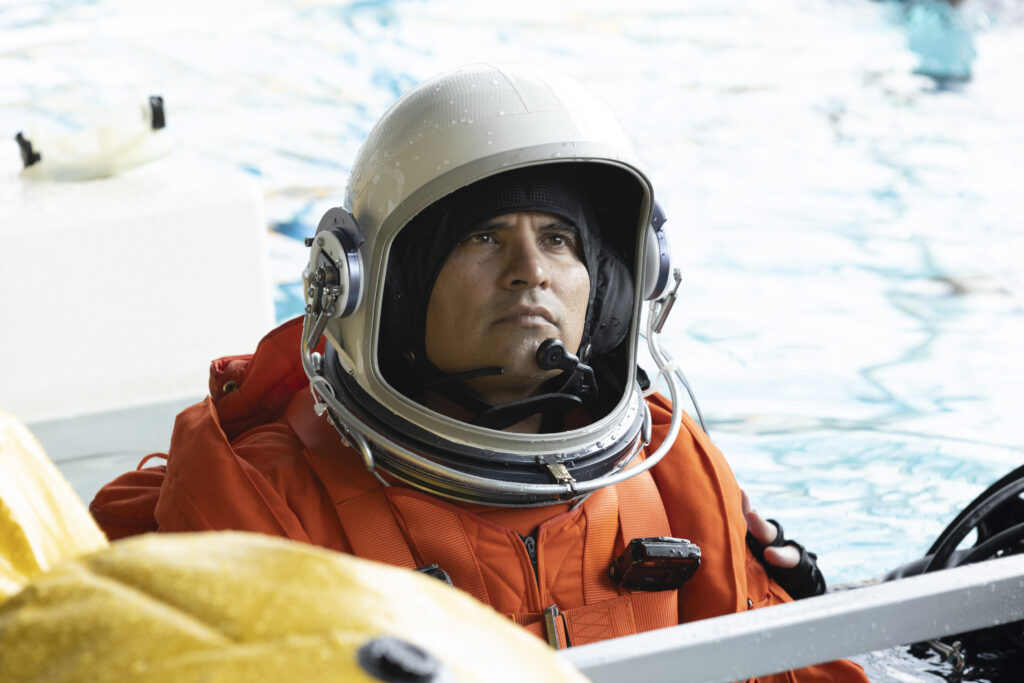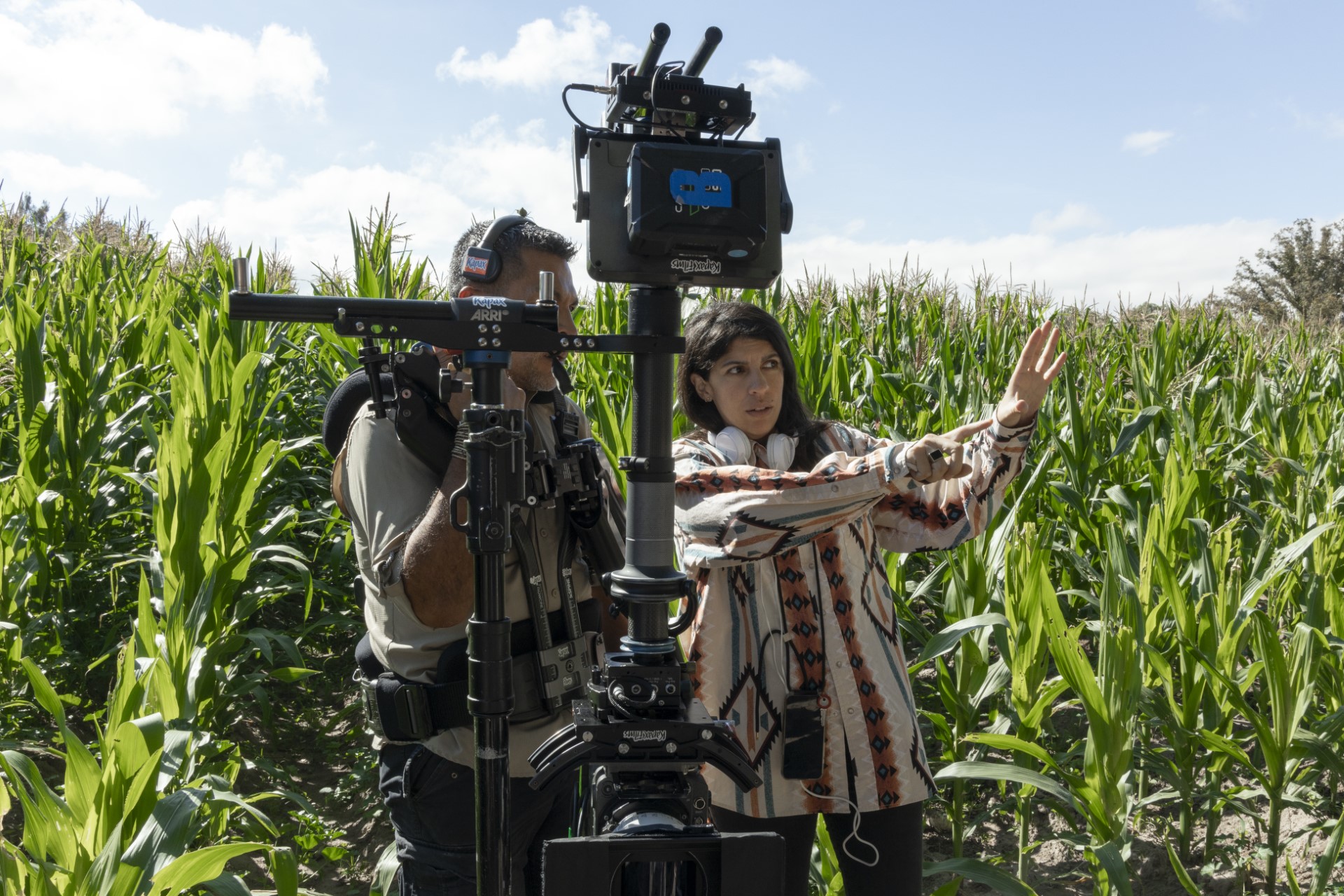Earlier this year, a meteorite glided across the luminescent night skies of Michoacán, Mexico, capturing the attention of everyone who could see it. These were the same skies that José Hernández, the first Mexican migrant worker to become an astronaut, was looking at when he realized why he was put on this Earth. Like the Monarch butterflies that migrate to and from Michoacán every year, Hernández had spent most of his young life traveling between his family’s home in Mexico and his own in Stockton, California, where he worked on a number of farms while attending school.
There’s something uniquely cinematic about Hernández’s story, a classic hero’s journey ripped straight from the pages of real life. Naturally, that meant adapting Hernández’s autobiography into an Amazon-produced film titled “A Million Miles Away.” The film’s director, Alejandra Márquez Abella, immediately felt some kind of kinship with Hernández, simply by fighting for the project in the first place. “When I heard the words migrant, farm worker, astronaut,” she said, “I knew the potential that the film could have.”
However, when she got the opportunity to pitch her vision for the film, Abella knew it would be an uphill battle. “I’m a double minority,” the director said. “I’m a Mexican female director. And when I was pursuing this project, I had to compete with 10 other dudes who were chasing the same objective.” Abella took a page from Hernández’s book, literally, and fought the odds, finding inspiration in the astronaut’s tenacious, relentless pursuit of something that many would consider impossible.
“It made me feel more confident about myself,” Abella said of Hernández’s story. “I didn’t have to prove anything, that my origins were correct, that my gender was correct.” The director acknowledged that because there aren’t enough female directors to identify a pattern and emulate it Abella has always had to trust her instincts as an artist and as a person. Similarly to Hernández, there wasn’t a roadmap to follow – she had to create one for herself.
For Abella, that meant having cinematic principles and sticking to them. Intent on avoiding the artistic pitfalls that plague younger directors, especially in an industry that doesn’t afford women the opportunity to fail upwards like some of their male counterparts, the director used her intuition as a north star. “This is such an inspirational story,” she said. “My job was to protect that. To not [make] something too melodramatic or too easy or obvious.”
The director worked closely with the real-life José Hernández to shape the trajectory of the story. Immediately, Abella considered him a kindred spirit. “The first time I met him we Zoomed, and it was a very familiar conversation,” she said. “He was in his kitchen with his wife, and his kids were saying hi in the back. I felt like I was with someone from my family.” Even as the film entered production and Hernández took a step back from the process, Abella sometimes depended on his words of wisdom and encouragement to stay on track. “It was a nice thing to have [that] assurance,” she said.
Abella’s confidence as a director has only grown over the years, culminating in a Best Picture Ariel award for her last film, “Northern Skies Over Empty Space.” Going up against Bardo, Abella emerged victorious against the legendary Mexican director Alejandro González Iñárritu, who she described as “super nice” and a champion of her work. Still, Abella knows she’ll have to continue proving herself on the international stage, regardless of the accolades under her belt.
Moreover, Abella seems less concerned with impressing audiences than she is with fulfilling her own artistic ambitions. “As a filmmaker, I get bored very easily,” she said. “I think you have to look for those amazing shots.” Balancing stylization and humility is one of Abella’s primary concerns, especially in an era of digital filmmaking that allows directors to execute increasingly complex oners, which are basically unbroken takes that cover a lot of ground or continue for an extended period of time. “I’m not a heroic filmmaker,” Abella said. “I always shoot a lot of oners planning on cutting them.”

Michael Peña as José Hernandez in “A Million Miles Away” (2023). Courtesy of Prime Video.
With this latest release, which opened to critical acclaim and became Amazon’s most-streamed movie of the week, Abella hopes to leverage her latest success to one day tell a deeply personal story about her grandmother’s migration to the United States. The director described her grandmother as the “Cesar Chavez of her block,” acting as a community leader in San Luis Potosí before moving to Chicago in the 1960s. “[That generation] got into the factory industry and the slaughterhouses. They lived with Italian migrants, Chinese migrants, Polish migrants,” she said. “Maybe it’s a sad story, but I think you have to have those as well.”
Abella’s first exposure to narrative storytelling, like many great directors, goes back to her childhood. Her father was a poet and historian, and the director ties her relationship with stories back to her upbringing. However, she admitted to having a proclivity for film that revolved somewhat around her desire to anticipate the variables of life. “I just like to control small universes. I think I’m afraid of life because life is super mysterious and I like to have these small worlds where I can provide balance and bring justice…or take it away,” she said. Adding, “I think I’m just a control freak.”
Abella’s origins as a director were as humble as they come. She describes her debut feature as “very, very cheap” with a budget that was “self-raised.” From there, she directed two more features that were financed through independent studios. She made her Best Picture-winning film “in the desert with a dolly and a couple of friends, and that was it.” With a million-dollar Amazon budget at her disposal, directing “A Million Miles Away” meant venturing off into the unknown. There was a vastness to the possibilities, not unlike a trip to outer space.
“A Million Miles Away” is Abella’s first English-language film, as well as her first studio film, which brought with it a wealth of resources as well as the ability to explore a more elaborate visual language. But an inflated budget came with the greater responsibility to remain true to what made Abella the filmmaker she is today. “Money can make the difference, but I think that you have to have a very concrete concept of what symbolisms you want to play with,” she said. “I think you have to have a very clear idea of what you want to say so that everything is permeated by that.”
Josef Rodriguez is a writer, filmmaker, and film critic living in New York City.










